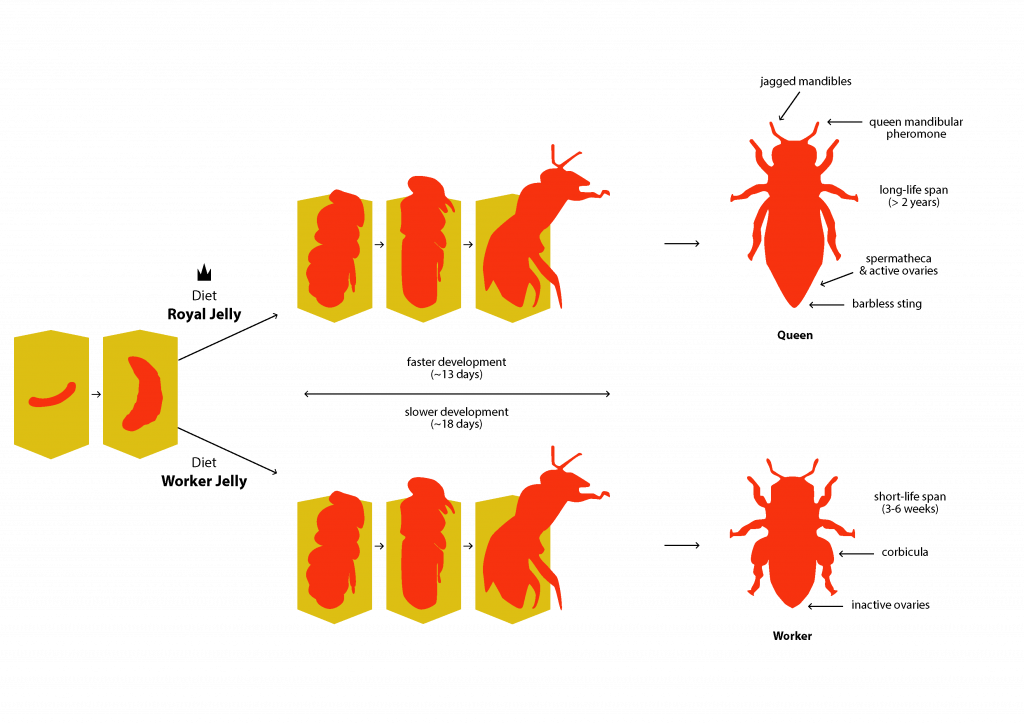The GECKO, or the Gametic Epigenetics Consortium against Obesity, is a consortium of researchers interested in nutrition, epigenetic inheritance and metabolic health.
The impact of nutritional intake on the processes of development is not a new field of scientific inquiry. One of the most iconic demonstrations of external environtal factors modulating embryonic development comes from honey bees. Honey bees develop into strikingly divergent adult phenotypes, such as the queen bee or the worker bee, based solely on the nutritional intake of each bee at the larval stage. In the case of a queen bee, consumption of ‘royal jelly’ as a larvae reduces the expression of a specific enzyme that establishes epigenetic marks via RNA interference, resulting in a bias towards queen developmental processes, rather than maturation into a worker bee. This striking and dramatic example of the effects of nutritional exposure on the developmental process and downstream phenotype of organisms gives compelling evidence to further study how nutritional exposures reshape the epigenome and alter the course of development across the animal kingdom.

Inspired by this example in bees, and various other species whose multigenerational developmental phenotypes have been reshaped by nutrition-mediated epigenetic programing, the GECKO was formed. The vision of GECKO is to take a comparative epigenomic approach to study a wide range of animal models, identifying the common nominator of lifestyle-mediated epigenetic inheritances and the possible human-specific mechanism that may be at play. We have goals of uncovering the role that nutrition-mediated gametic epigenetic remodeling plays in evolutionary processes, species differentiation, offspring phenotypes, and human-specific inherited predisposition to obesity and metabolic disorders.
The GECKO is comprised of three leading research groups headed by Professor Romain Barrès at the University of Copenhagen, Professor Stephen Simpson at the University of Sydney and Professor Marcelo Nobrega at the University of Chicago.
Professor Romain Barrès has been a pioneer in the field of epigenetic inheritance, with involvement in several seminal studies identifying that environmental factors, such as diet or physical activity, could remodel epigenetic information in gametic cells, suggesting epigenetic information to be at the interface between our genes, our environment, and the downstream phenotypes and predisposition to diseases for the next generations of offspring. Evidence from these studies has specifically highlighted the effect of paternal lifestyle factors in one generation, to a predisposition to diabetes and obesity in the subsequent offspring, wherein this effect appears to be most notably induced by the epigenetic signature of spermatozoa. This line of research has led Romain to build his research outputs around the aim of addressing the fascinating question of: “How much our free-will alters the way our genes are expressed and do we transmit our environmental attributes to our offspring?”
Professor Stephen Simpson has revolutionised nutritional research through a combination of unifying theoretical and experimental advances. Together with colleague David Raubenheimer, he invented the Nutritional Geometric Framework (NGF), which integrates nutritional understandings across scales, spanning molecules to ecosystems, and which has been applied to major problems in ecology, evolution, agriculture and human health. Simpson has also led the field of research into swarming in locusts, from neurochemical mechanisms to continental scale mass migration. His research into human nutrition has a solid translational component linking laboratory and clinical studies.
Professor Marcelo Nobrega has developed next generation sequence-based strategies to characterize regulatory properties of enhancers in high throughput assays ranging from single cell to in vivo organismal assays. His group has generated genome-wide reference maps for chromatin accessibility, long-range promoter-enhancer interactions, and gene expression for multiple human and mouse tissues and cell types. He has spearheaded intersection of these genome-wide maps with genetic variation across populations, as a strategy to gain insights into loci that are associated with common human diseases. Using this strategy, he has made significant contributions in understandings of genetic and epigenetic determinants of diseases including diabetes, obesity, cardiac arrhythmias, heart failure, asthma, allergies, and cancer.
The GECKO consortium has been built around utilising the complimentary methodological expertise across the founding partners including epigenetic mechanisms, developmental biology, experimental nutritional, bioinformatic approaches, evolution, and comparative biology to understand the impact of diet on our epigenetic profile, how this impact is conserved across the animal kingdom, and how this epigenetic signature can be passed on to future generations and, in some cases, lead to increased risk of obesity.
The consortium is being funded from 2019 to 2025 by a Novo Nordisk Foundation Challenge grant.